Reflective Learning: Orientation for Success in Higher Education
VerifiedAdded on 2023/06/18
|9
|2265
|157
Essay
AI Summary
This essay explores the significance of reflective learning in higher education, particularly within the context of business and management studies. It highlights the impact of COVID-19 on the hospitality industry and emphasizes the importance of formative feedback in enhancing summative assessments. The essay also identifies cultural and behavioral expectations for students pursuing a business management degree, underscoring the value of inclusivity and professional conduct. Furthermore, it discusses the critical role of peer-to-peer support and team working in improving the overall learning experience. The conclusion reiterates the importance of higher education in developing capabilities and knowledge, addressing the challenges posed by the pandemic, and promoting a holistic approach to student development through reflective practices and collaborative learning strategies. Desklib provides access to this essay and a wealth of resources for students seeking academic support.
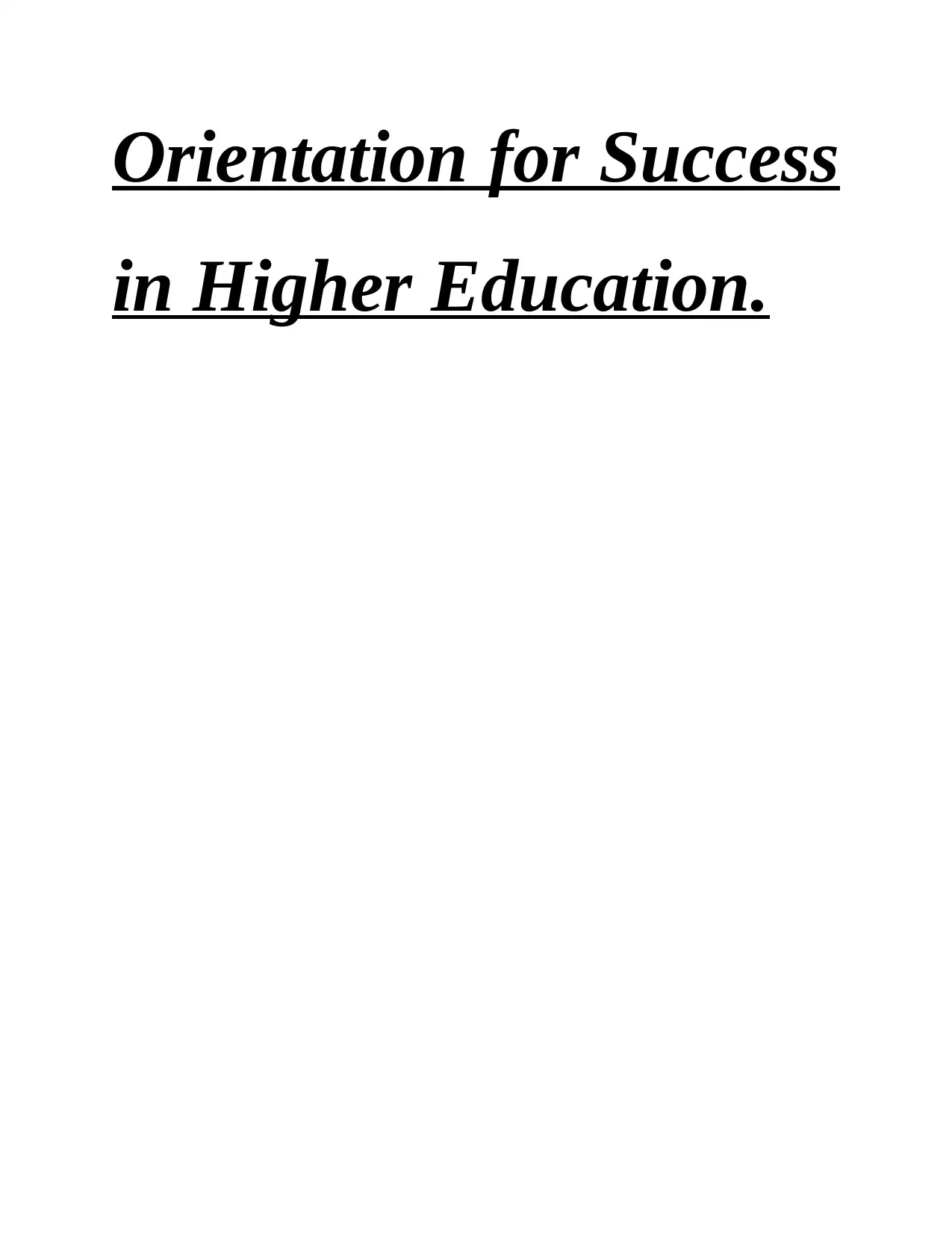
Orientation for Success
in Higher Education.
in Higher Education.
Paraphrase This Document
Need a fresh take? Get an instant paraphrase of this document with our AI Paraphraser
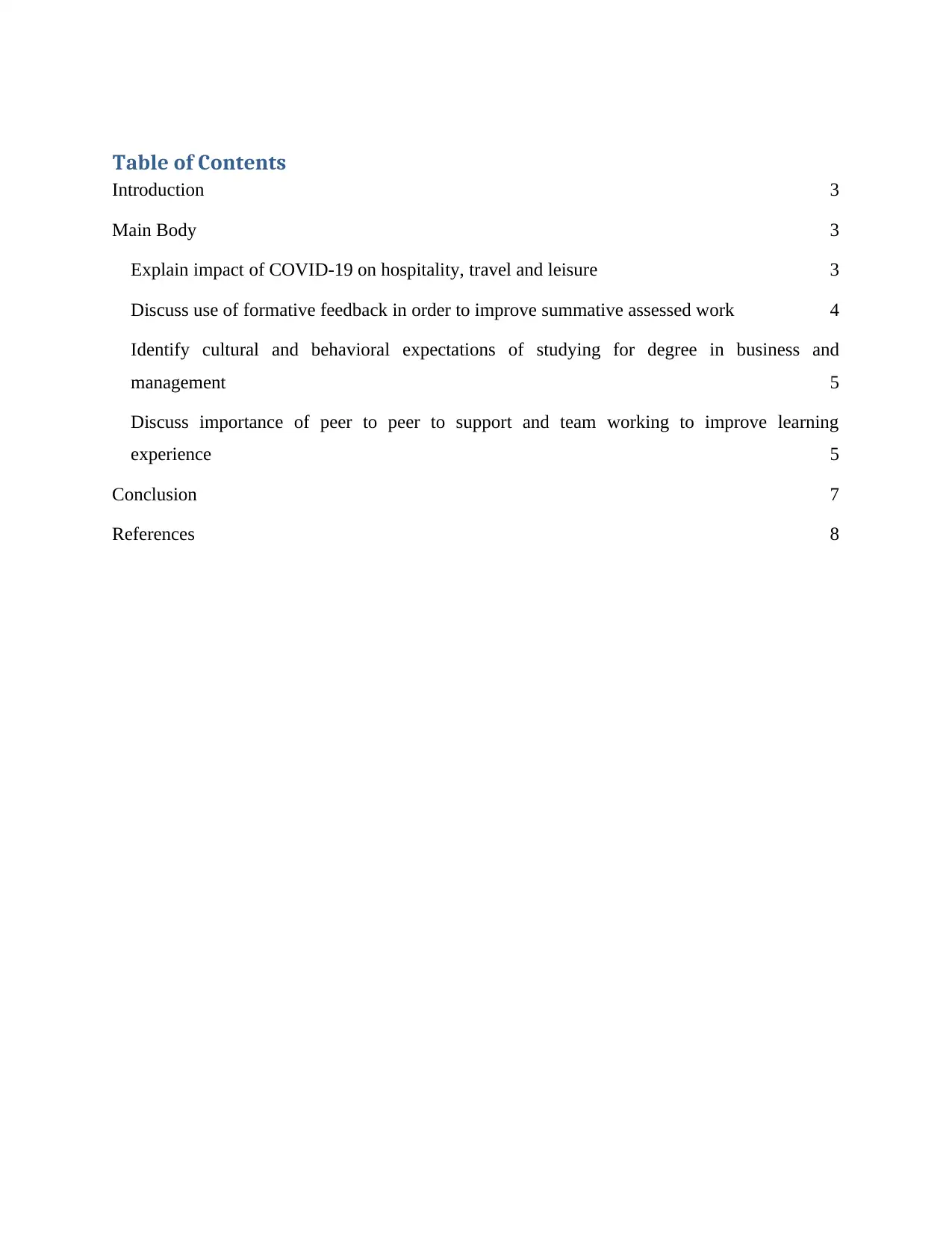
Table of Contents
Introduction 3
Main Body 3
Explain impact of COVID-19 on hospitality, travel and leisure 3
Discuss use of formative feedback in order to improve summative assessed work 4
Identify cultural and behavioral expectations of studying for degree in business and
management 5
Discuss importance of peer to peer to support and team working to improve learning
experience 5
Conclusion 7
References 8
Introduction 3
Main Body 3
Explain impact of COVID-19 on hospitality, travel and leisure 3
Discuss use of formative feedback in order to improve summative assessed work 4
Identify cultural and behavioral expectations of studying for degree in business and
management 5
Discuss importance of peer to peer to support and team working to improve learning
experience 5
Conclusion 7
References 8
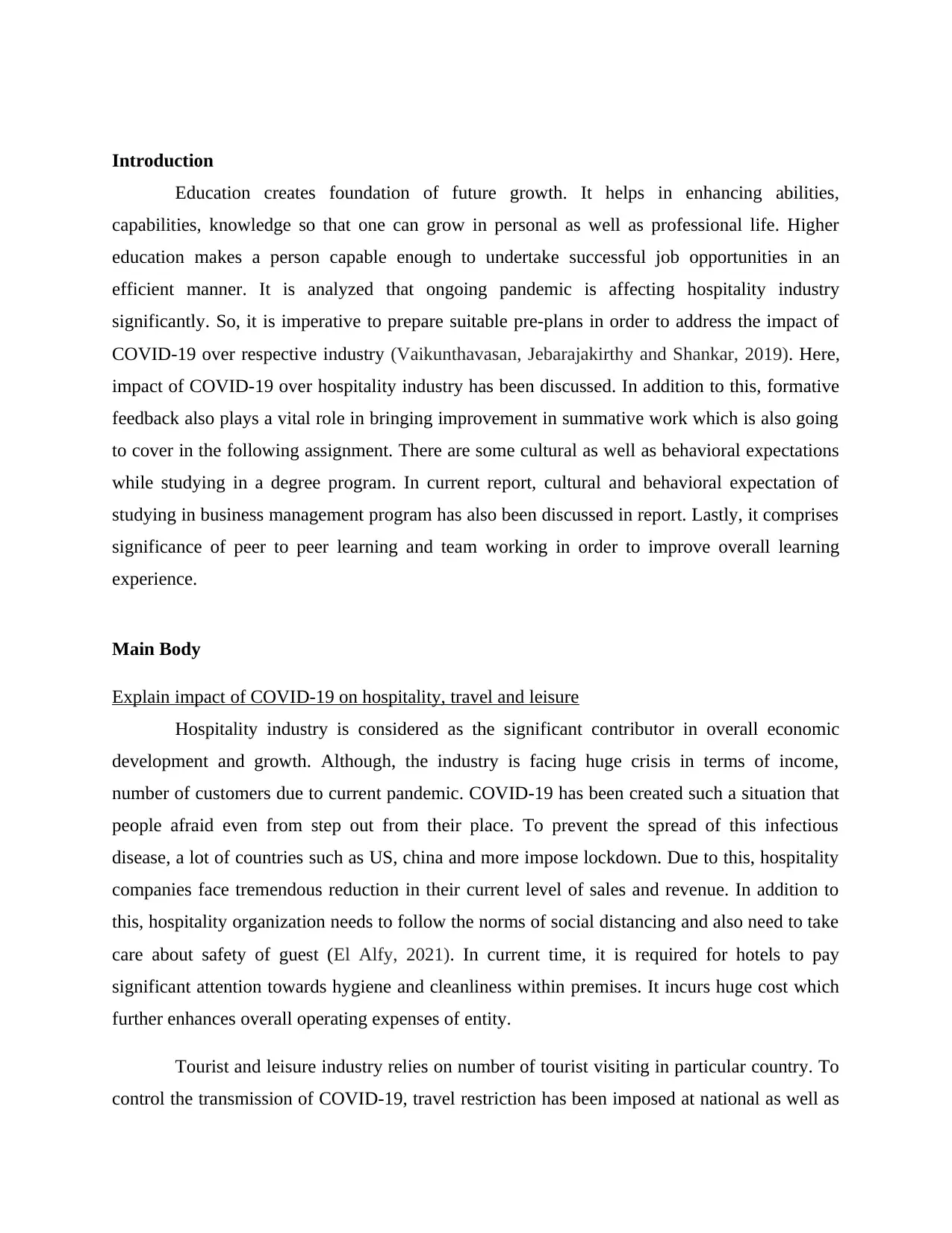
Introduction
Education creates foundation of future growth. It helps in enhancing abilities,
capabilities, knowledge so that one can grow in personal as well as professional life. Higher
education makes a person capable enough to undertake successful job opportunities in an
efficient manner. It is analyzed that ongoing pandemic is affecting hospitality industry
significantly. So, it is imperative to prepare suitable pre-plans in order to address the impact of
COVID-19 over respective industry (Vaikunthavasan, Jebarajakirthy and Shankar, 2019). Here,
impact of COVID-19 over hospitality industry has been discussed. In addition to this, formative
feedback also plays a vital role in bringing improvement in summative work which is also going
to cover in the following assignment. There are some cultural as well as behavioral expectations
while studying in a degree program. In current report, cultural and behavioral expectation of
studying in business management program has also been discussed in report. Lastly, it comprises
significance of peer to peer learning and team working in order to improve overall learning
experience.
Main Body
Explain impact of COVID-19 on hospitality, travel and leisure
Hospitality industry is considered as the significant contributor in overall economic
development and growth. Although, the industry is facing huge crisis in terms of income,
number of customers due to current pandemic. COVID-19 has been created such a situation that
people afraid even from step out from their place. To prevent the spread of this infectious
disease, a lot of countries such as US, china and more impose lockdown. Due to this, hospitality
companies face tremendous reduction in their current level of sales and revenue. In addition to
this, hospitality organization needs to follow the norms of social distancing and also need to take
care about safety of guest (El Alfy, 2021). In current time, it is required for hotels to pay
significant attention towards hygiene and cleanliness within premises. It incurs huge cost which
further enhances overall operating expenses of entity.
Tourist and leisure industry relies on number of tourist visiting in particular country. To
control the transmission of COVID-19, travel restriction has been imposed at national as well as
Education creates foundation of future growth. It helps in enhancing abilities,
capabilities, knowledge so that one can grow in personal as well as professional life. Higher
education makes a person capable enough to undertake successful job opportunities in an
efficient manner. It is analyzed that ongoing pandemic is affecting hospitality industry
significantly. So, it is imperative to prepare suitable pre-plans in order to address the impact of
COVID-19 over respective industry (Vaikunthavasan, Jebarajakirthy and Shankar, 2019). Here,
impact of COVID-19 over hospitality industry has been discussed. In addition to this, formative
feedback also plays a vital role in bringing improvement in summative work which is also going
to cover in the following assignment. There are some cultural as well as behavioral expectations
while studying in a degree program. In current report, cultural and behavioral expectation of
studying in business management program has also been discussed in report. Lastly, it comprises
significance of peer to peer learning and team working in order to improve overall learning
experience.
Main Body
Explain impact of COVID-19 on hospitality, travel and leisure
Hospitality industry is considered as the significant contributor in overall economic
development and growth. Although, the industry is facing huge crisis in terms of income,
number of customers due to current pandemic. COVID-19 has been created such a situation that
people afraid even from step out from their place. To prevent the spread of this infectious
disease, a lot of countries such as US, china and more impose lockdown. Due to this, hospitality
companies face tremendous reduction in their current level of sales and revenue. In addition to
this, hospitality organization needs to follow the norms of social distancing and also need to take
care about safety of guest (El Alfy, 2021). In current time, it is required for hotels to pay
significant attention towards hygiene and cleanliness within premises. It incurs huge cost which
further enhances overall operating expenses of entity.
Tourist and leisure industry relies on number of tourist visiting in particular country. To
control the transmission of COVID-19, travel restriction has been imposed at national as well as
⊘ This is a preview!⊘
Do you want full access?
Subscribe today to unlock all pages.

Trusted by 1+ million students worldwide
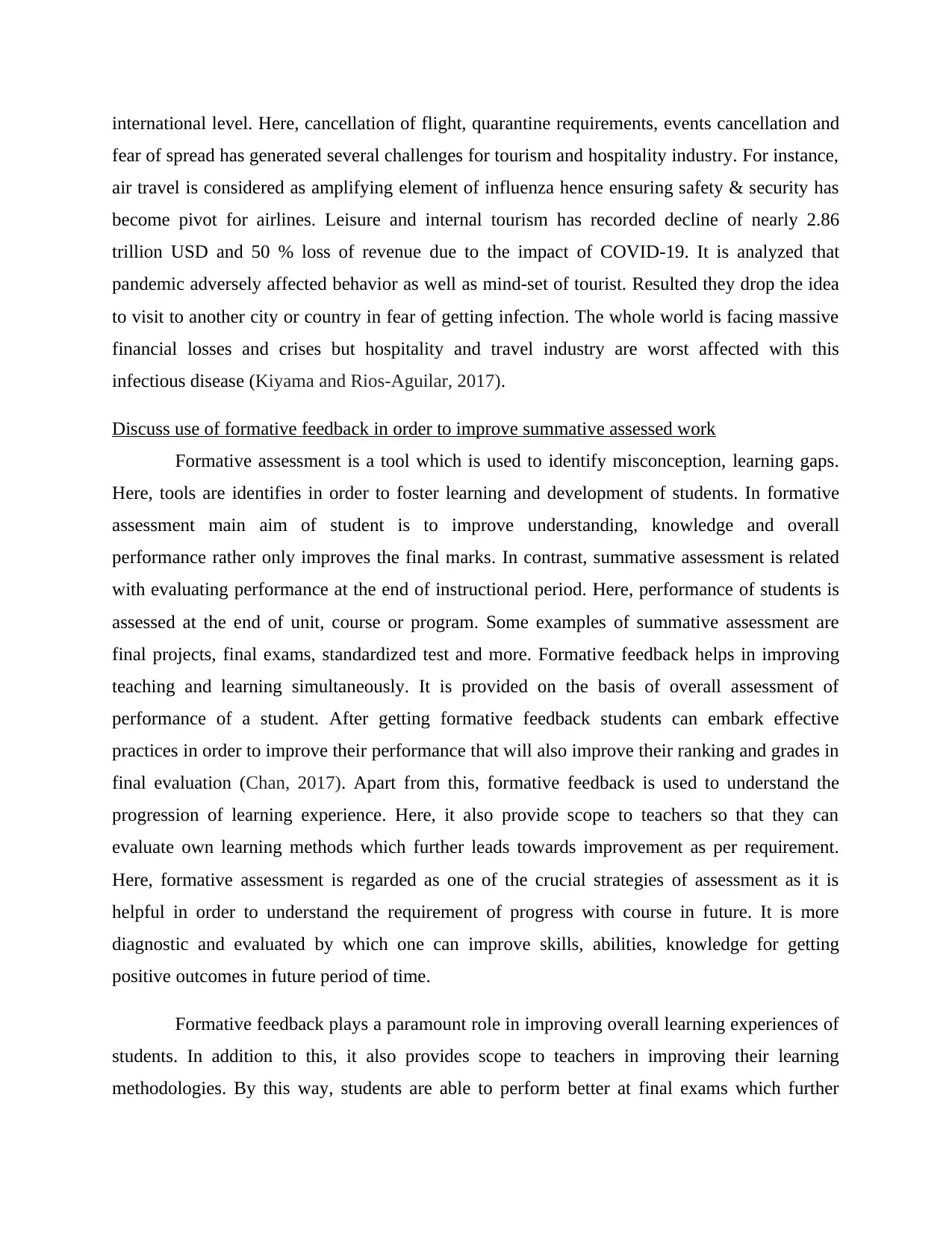
international level. Here, cancellation of flight, quarantine requirements, events cancellation and
fear of spread has generated several challenges for tourism and hospitality industry. For instance,
air travel is considered as amplifying element of influenza hence ensuring safety & security has
become pivot for airlines. Leisure and internal tourism has recorded decline of nearly 2.86
trillion USD and 50 % loss of revenue due to the impact of COVID-19. It is analyzed that
pandemic adversely affected behavior as well as mind-set of tourist. Resulted they drop the idea
to visit to another city or country in fear of getting infection. The whole world is facing massive
financial losses and crises but hospitality and travel industry are worst affected with this
infectious disease (Kiyama and Rios-Aguilar, 2017).
Discuss use of formative feedback in order to improve summative assessed work
Formative assessment is a tool which is used to identify misconception, learning gaps.
Here, tools are identifies in order to foster learning and development of students. In formative
assessment main aim of student is to improve understanding, knowledge and overall
performance rather only improves the final marks. In contrast, summative assessment is related
with evaluating performance at the end of instructional period. Here, performance of students is
assessed at the end of unit, course or program. Some examples of summative assessment are
final projects, final exams, standardized test and more. Formative feedback helps in improving
teaching and learning simultaneously. It is provided on the basis of overall assessment of
performance of a student. After getting formative feedback students can embark effective
practices in order to improve their performance that will also improve their ranking and grades in
final evaluation (Chan, 2017). Apart from this, formative feedback is used to understand the
progression of learning experience. Here, it also provide scope to teachers so that they can
evaluate own learning methods which further leads towards improvement as per requirement.
Here, formative assessment is regarded as one of the crucial strategies of assessment as it is
helpful in order to understand the requirement of progress with course in future. It is more
diagnostic and evaluated by which one can improve skills, abilities, knowledge for getting
positive outcomes in future period of time.
Formative feedback plays a paramount role in improving overall learning experiences of
students. In addition to this, it also provides scope to teachers in improving their learning
methodologies. By this way, students are able to perform better at final exams which further
fear of spread has generated several challenges for tourism and hospitality industry. For instance,
air travel is considered as amplifying element of influenza hence ensuring safety & security has
become pivot for airlines. Leisure and internal tourism has recorded decline of nearly 2.86
trillion USD and 50 % loss of revenue due to the impact of COVID-19. It is analyzed that
pandemic adversely affected behavior as well as mind-set of tourist. Resulted they drop the idea
to visit to another city or country in fear of getting infection. The whole world is facing massive
financial losses and crises but hospitality and travel industry are worst affected with this
infectious disease (Kiyama and Rios-Aguilar, 2017).
Discuss use of formative feedback in order to improve summative assessed work
Formative assessment is a tool which is used to identify misconception, learning gaps.
Here, tools are identifies in order to foster learning and development of students. In formative
assessment main aim of student is to improve understanding, knowledge and overall
performance rather only improves the final marks. In contrast, summative assessment is related
with evaluating performance at the end of instructional period. Here, performance of students is
assessed at the end of unit, course or program. Some examples of summative assessment are
final projects, final exams, standardized test and more. Formative feedback helps in improving
teaching and learning simultaneously. It is provided on the basis of overall assessment of
performance of a student. After getting formative feedback students can embark effective
practices in order to improve their performance that will also improve their ranking and grades in
final evaluation (Chan, 2017). Apart from this, formative feedback is used to understand the
progression of learning experience. Here, it also provide scope to teachers so that they can
evaluate own learning methods which further leads towards improvement as per requirement.
Here, formative assessment is regarded as one of the crucial strategies of assessment as it is
helpful in order to understand the requirement of progress with course in future. It is more
diagnostic and evaluated by which one can improve skills, abilities, knowledge for getting
positive outcomes in future period of time.
Formative feedback plays a paramount role in improving overall learning experiences of
students. In addition to this, it also provides scope to teachers in improving their learning
methodologies. By this way, students are able to perform better at final exams which further
Paraphrase This Document
Need a fresh take? Get an instant paraphrase of this document with our AI Paraphraser
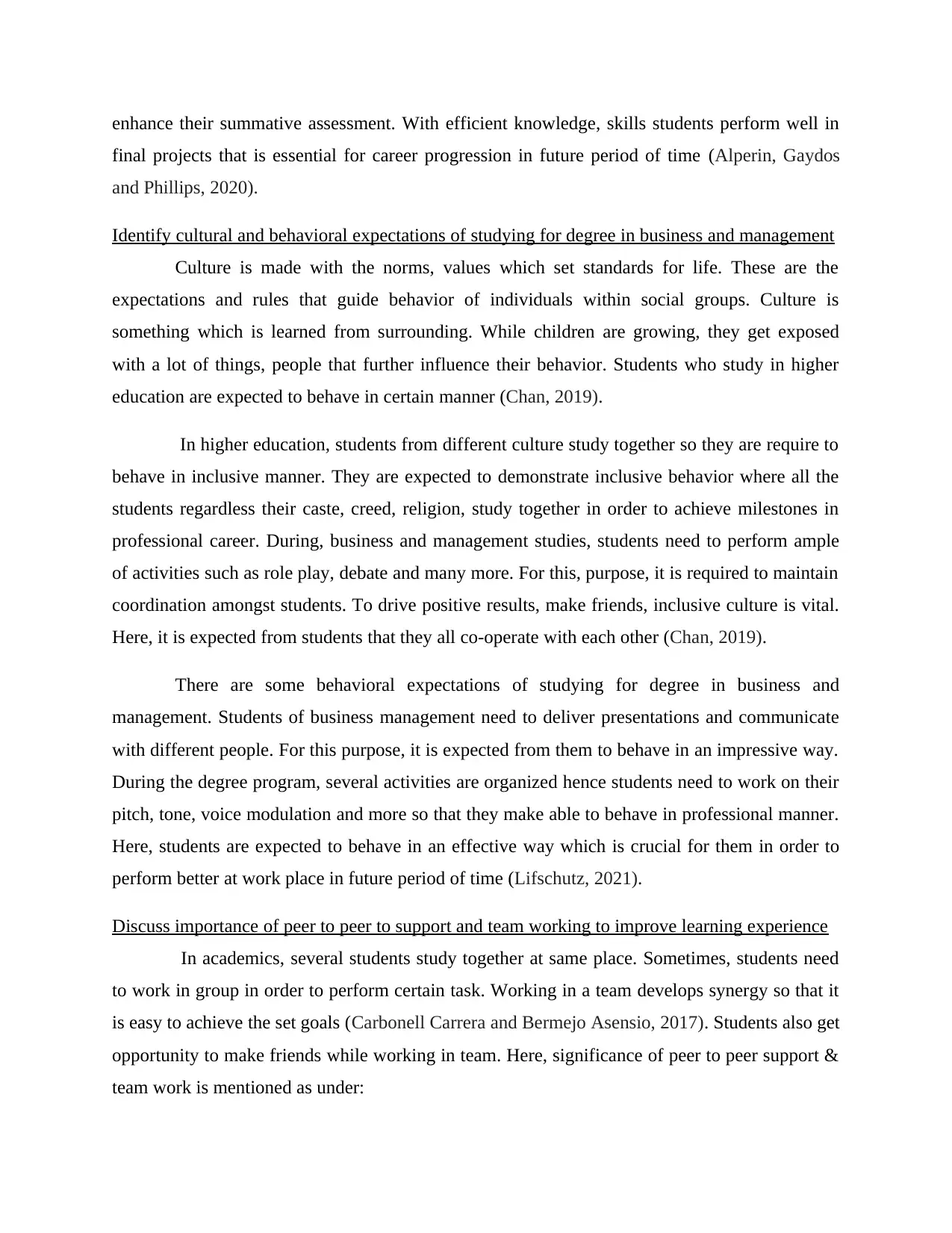
enhance their summative assessment. With efficient knowledge, skills students perform well in
final projects that is essential for career progression in future period of time (Alperin, Gaydos
and Phillips, 2020).
Identify cultural and behavioral expectations of studying for degree in business and management
Culture is made with the norms, values which set standards for life. These are the
expectations and rules that guide behavior of individuals within social groups. Culture is
something which is learned from surrounding. While children are growing, they get exposed
with a lot of things, people that further influence their behavior. Students who study in higher
education are expected to behave in certain manner (Chan, 2019).
In higher education, students from different culture study together so they are require to
behave in inclusive manner. They are expected to demonstrate inclusive behavior where all the
students regardless their caste, creed, religion, study together in order to achieve milestones in
professional career. During, business and management studies, students need to perform ample
of activities such as role play, debate and many more. For this, purpose, it is required to maintain
coordination amongst students. To drive positive results, make friends, inclusive culture is vital.
Here, it is expected from students that they all co-operate with each other (Chan, 2019).
There are some behavioral expectations of studying for degree in business and
management. Students of business management need to deliver presentations and communicate
with different people. For this purpose, it is expected from them to behave in an impressive way.
During the degree program, several activities are organized hence students need to work on their
pitch, tone, voice modulation and more so that they make able to behave in professional manner.
Here, students are expected to behave in an effective way which is crucial for them in order to
perform better at work place in future period of time (Lifschutz, 2021).
Discuss importance of peer to peer to support and team working to improve learning experience
In academics, several students study together at same place. Sometimes, students need
to work in group in order to perform certain task. Working in a team develops synergy so that it
is easy to achieve the set goals (Carbonell Carrera and Bermejo Asensio, 2017). Students also get
opportunity to make friends while working in team. Here, significance of peer to peer support &
team work is mentioned as under:
final projects that is essential for career progression in future period of time (Alperin, Gaydos
and Phillips, 2020).
Identify cultural and behavioral expectations of studying for degree in business and management
Culture is made with the norms, values which set standards for life. These are the
expectations and rules that guide behavior of individuals within social groups. Culture is
something which is learned from surrounding. While children are growing, they get exposed
with a lot of things, people that further influence their behavior. Students who study in higher
education are expected to behave in certain manner (Chan, 2019).
In higher education, students from different culture study together so they are require to
behave in inclusive manner. They are expected to demonstrate inclusive behavior where all the
students regardless their caste, creed, religion, study together in order to achieve milestones in
professional career. During, business and management studies, students need to perform ample
of activities such as role play, debate and many more. For this, purpose, it is required to maintain
coordination amongst students. To drive positive results, make friends, inclusive culture is vital.
Here, it is expected from students that they all co-operate with each other (Chan, 2019).
There are some behavioral expectations of studying for degree in business and
management. Students of business management need to deliver presentations and communicate
with different people. For this purpose, it is expected from them to behave in an impressive way.
During the degree program, several activities are organized hence students need to work on their
pitch, tone, voice modulation and more so that they make able to behave in professional manner.
Here, students are expected to behave in an effective way which is crucial for them in order to
perform better at work place in future period of time (Lifschutz, 2021).
Discuss importance of peer to peer to support and team working to improve learning experience
In academics, several students study together at same place. Sometimes, students need
to work in group in order to perform certain task. Working in a team develops synergy so that it
is easy to achieve the set goals (Carbonell Carrera and Bermejo Asensio, 2017). Students also get
opportunity to make friends while working in team. Here, significance of peer to peer support &
team work is mentioned as under:
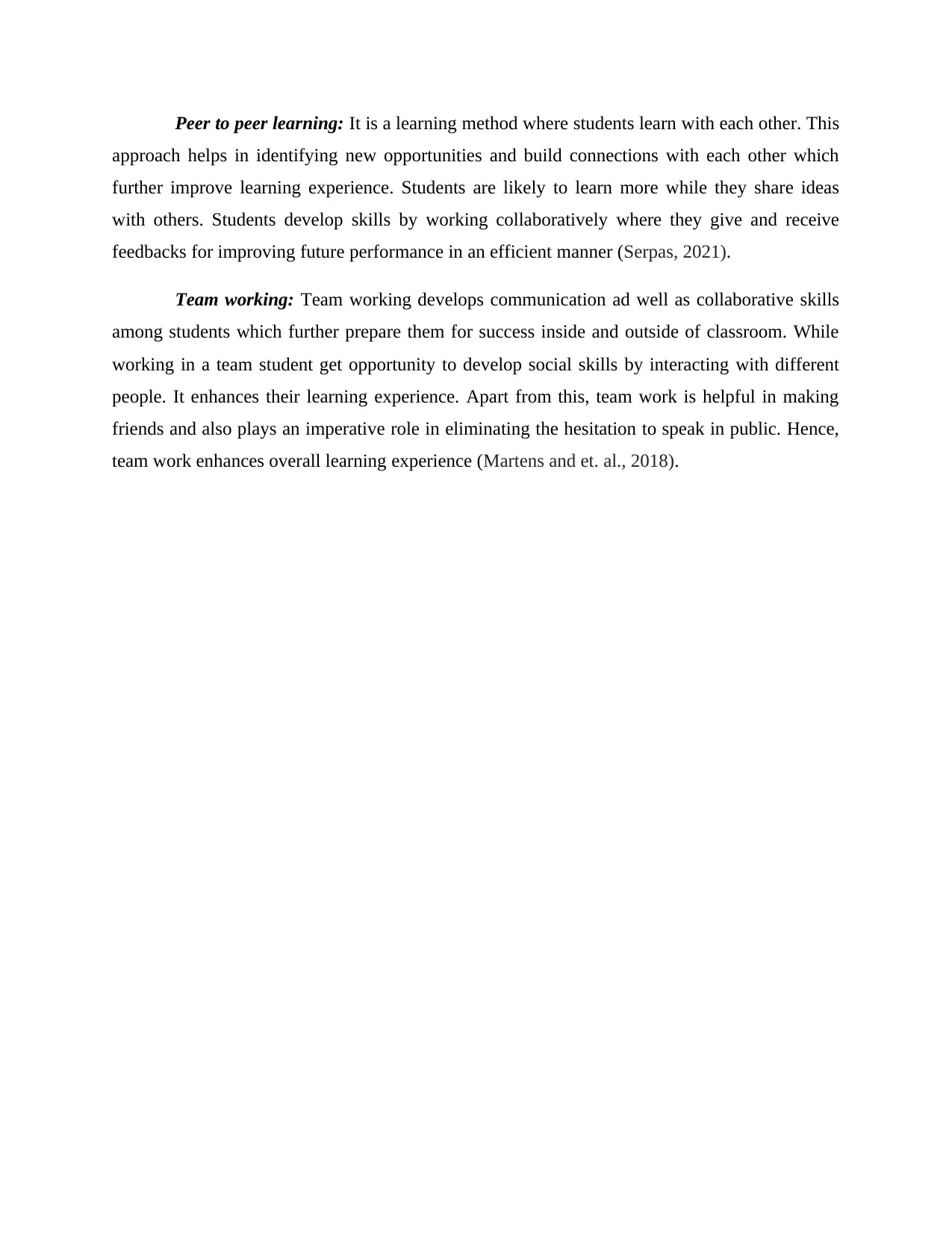
Peer to peer learning: It is a learning method where students learn with each other. This
approach helps in identifying new opportunities and build connections with each other which
further improve learning experience. Students are likely to learn more while they share ideas
with others. Students develop skills by working collaboratively where they give and receive
feedbacks for improving future performance in an efficient manner (Serpas, 2021).
Team working: Team working develops communication ad well as collaborative skills
among students which further prepare them for success inside and outside of classroom. While
working in a team student get opportunity to develop social skills by interacting with different
people. It enhances their learning experience. Apart from this, team work is helpful in making
friends and also plays an imperative role in eliminating the hesitation to speak in public. Hence,
team work enhances overall learning experience (Martens and et. al., 2018).
approach helps in identifying new opportunities and build connections with each other which
further improve learning experience. Students are likely to learn more while they share ideas
with others. Students develop skills by working collaboratively where they give and receive
feedbacks for improving future performance in an efficient manner (Serpas, 2021).
Team working: Team working develops communication ad well as collaborative skills
among students which further prepare them for success inside and outside of classroom. While
working in a team student get opportunity to develop social skills by interacting with different
people. It enhances their learning experience. Apart from this, team work is helpful in making
friends and also plays an imperative role in eliminating the hesitation to speak in public. Hence,
team work enhances overall learning experience (Martens and et. al., 2018).
⊘ This is a preview!⊘
Do you want full access?
Subscribe today to unlock all pages.

Trusted by 1+ million students worldwide
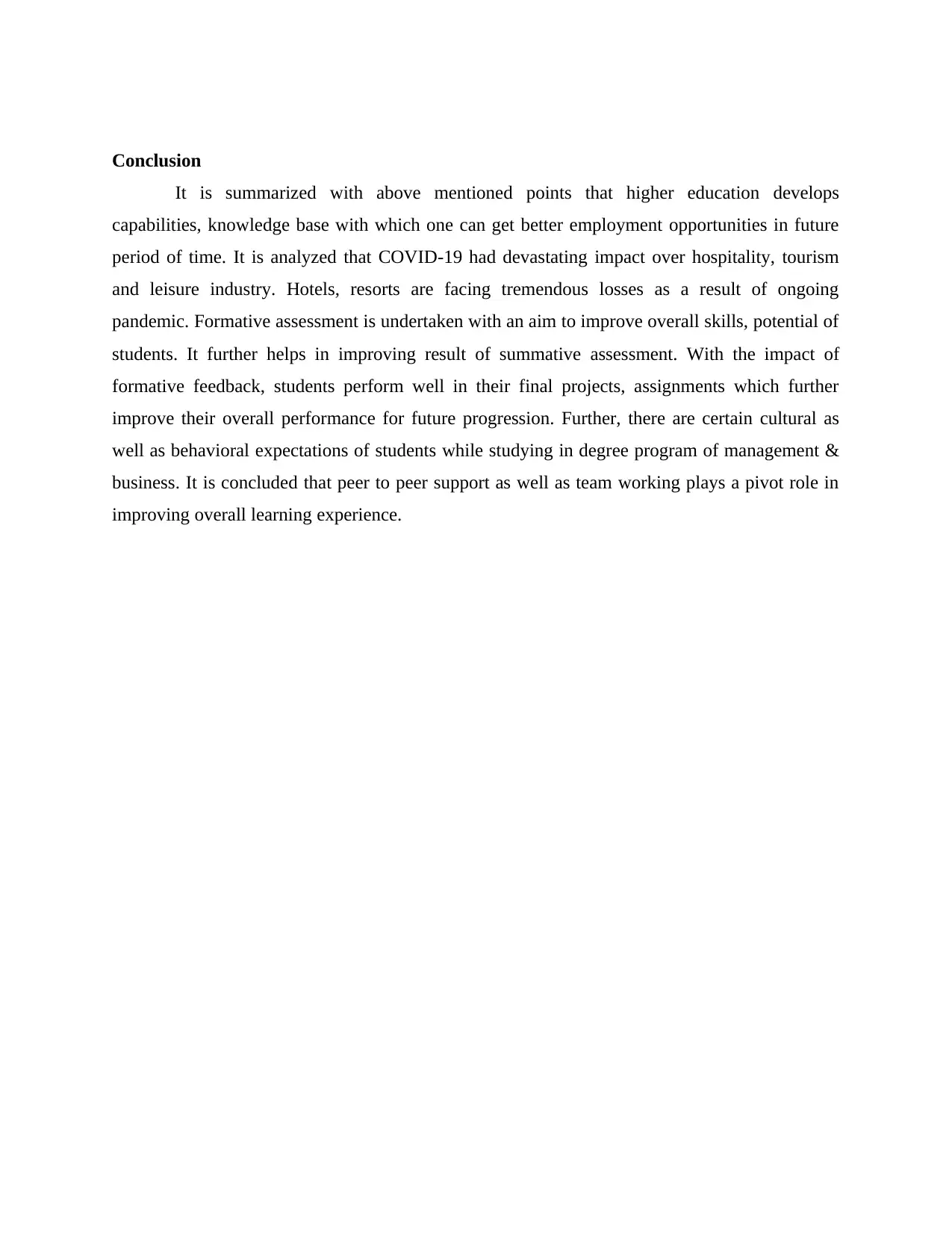
Conclusion
It is summarized with above mentioned points that higher education develops
capabilities, knowledge base with which one can get better employment opportunities in future
period of time. It is analyzed that COVID-19 had devastating impact over hospitality, tourism
and leisure industry. Hotels, resorts are facing tremendous losses as a result of ongoing
pandemic. Formative assessment is undertaken with an aim to improve overall skills, potential of
students. It further helps in improving result of summative assessment. With the impact of
formative feedback, students perform well in their final projects, assignments which further
improve their overall performance for future progression. Further, there are certain cultural as
well as behavioral expectations of students while studying in degree program of management &
business. It is concluded that peer to peer support as well as team working plays a pivot role in
improving overall learning experience.
It is summarized with above mentioned points that higher education develops
capabilities, knowledge base with which one can get better employment opportunities in future
period of time. It is analyzed that COVID-19 had devastating impact over hospitality, tourism
and leisure industry. Hotels, resorts are facing tremendous losses as a result of ongoing
pandemic. Formative assessment is undertaken with an aim to improve overall skills, potential of
students. It further helps in improving result of summative assessment. With the impact of
formative feedback, students perform well in their final projects, assignments which further
improve their overall performance for future progression. Further, there are certain cultural as
well as behavioral expectations of students while studying in degree program of management &
business. It is concluded that peer to peer support as well as team working plays a pivot role in
improving overall learning experience.
Paraphrase This Document
Need a fresh take? Get an instant paraphrase of this document with our AI Paraphraser
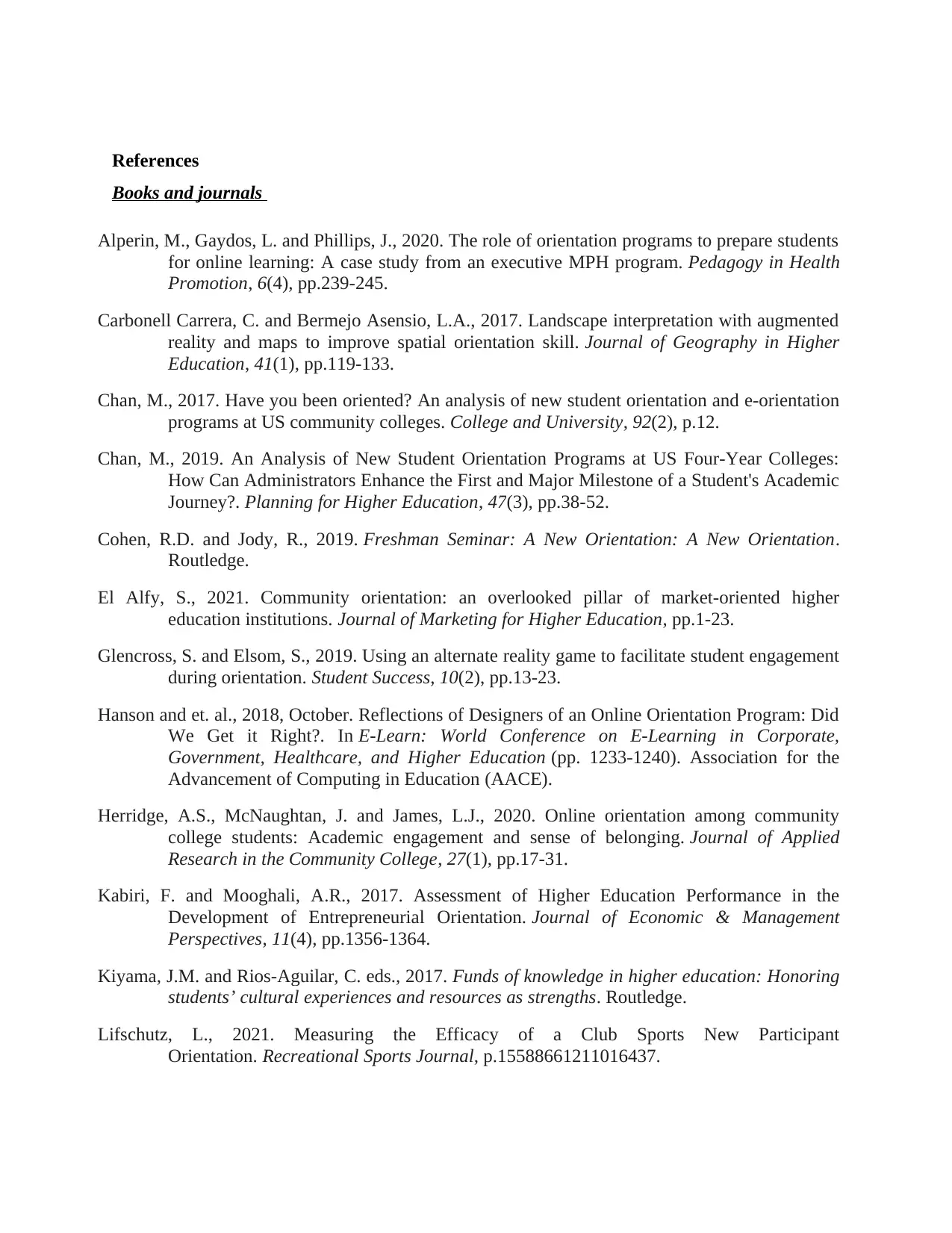
References
Books and journals
Alperin, M., Gaydos, L. and Phillips, J., 2020. The role of orientation programs to prepare students
for online learning: A case study from an executive MPH program. Pedagogy in Health
Promotion, 6(4), pp.239-245.
Carbonell Carrera, C. and Bermejo Asensio, L.A., 2017. Landscape interpretation with augmented
reality and maps to improve spatial orientation skill. Journal of Geography in Higher
Education, 41(1), pp.119-133.
Chan, M., 2017. Have you been oriented? An analysis of new student orientation and e-orientation
programs at US community colleges. College and University, 92(2), p.12.
Chan, M., 2019. An Analysis of New Student Orientation Programs at US Four-Year Colleges:
How Can Administrators Enhance the First and Major Milestone of a Student's Academic
Journey?. Planning for Higher Education, 47(3), pp.38-52.
Cohen, R.D. and Jody, R., 2019. Freshman Seminar: A New Orientation: A New Orientation.
Routledge.
El Alfy, S., 2021. Community orientation: an overlooked pillar of market-oriented higher
education institutions. Journal of Marketing for Higher Education, pp.1-23.
Glencross, S. and Elsom, S., 2019. Using an alternate reality game to facilitate student engagement
during orientation. Student Success, 10(2), pp.13-23.
Hanson and et. al., 2018, October. Reflections of Designers of an Online Orientation Program: Did
We Get it Right?. In E-Learn: World Conference on E-Learning in Corporate,
Government, Healthcare, and Higher Education (pp. 1233-1240). Association for the
Advancement of Computing in Education (AACE).
Herridge, A.S., McNaughtan, J. and James, L.J., 2020. Online orientation among community
college students: Academic engagement and sense of belonging. Journal of Applied
Research in the Community College, 27(1), pp.17-31.
Kabiri, F. and Mooghali, A.R., 2017. Assessment of Higher Education Performance in the
Development of Entrepreneurial Orientation. Journal of Economic & Management
Perspectives, 11(4), pp.1356-1364.
Kiyama, J.M. and Rios-Aguilar, C. eds., 2017. Funds of knowledge in higher education: Honoring
students’ cultural experiences and resources as strengths. Routledge.
Lifschutz, L., 2021. Measuring the Efficacy of a Club Sports New Participant
Orientation. Recreational Sports Journal, p.15588661211016437.
Books and journals
Alperin, M., Gaydos, L. and Phillips, J., 2020. The role of orientation programs to prepare students
for online learning: A case study from an executive MPH program. Pedagogy in Health
Promotion, 6(4), pp.239-245.
Carbonell Carrera, C. and Bermejo Asensio, L.A., 2017. Landscape interpretation with augmented
reality and maps to improve spatial orientation skill. Journal of Geography in Higher
Education, 41(1), pp.119-133.
Chan, M., 2017. Have you been oriented? An analysis of new student orientation and e-orientation
programs at US community colleges. College and University, 92(2), p.12.
Chan, M., 2019. An Analysis of New Student Orientation Programs at US Four-Year Colleges:
How Can Administrators Enhance the First and Major Milestone of a Student's Academic
Journey?. Planning for Higher Education, 47(3), pp.38-52.
Cohen, R.D. and Jody, R., 2019. Freshman Seminar: A New Orientation: A New Orientation.
Routledge.
El Alfy, S., 2021. Community orientation: an overlooked pillar of market-oriented higher
education institutions. Journal of Marketing for Higher Education, pp.1-23.
Glencross, S. and Elsom, S., 2019. Using an alternate reality game to facilitate student engagement
during orientation. Student Success, 10(2), pp.13-23.
Hanson and et. al., 2018, October. Reflections of Designers of an Online Orientation Program: Did
We Get it Right?. In E-Learn: World Conference on E-Learning in Corporate,
Government, Healthcare, and Higher Education (pp. 1233-1240). Association for the
Advancement of Computing in Education (AACE).
Herridge, A.S., McNaughtan, J. and James, L.J., 2020. Online orientation among community
college students: Academic engagement and sense of belonging. Journal of Applied
Research in the Community College, 27(1), pp.17-31.
Kabiri, F. and Mooghali, A.R., 2017. Assessment of Higher Education Performance in the
Development of Entrepreneurial Orientation. Journal of Economic & Management
Perspectives, 11(4), pp.1356-1364.
Kiyama, J.M. and Rios-Aguilar, C. eds., 2017. Funds of knowledge in higher education: Honoring
students’ cultural experiences and resources as strengths. Routledge.
Lifschutz, L., 2021. Measuring the Efficacy of a Club Sports New Participant
Orientation. Recreational Sports Journal, p.15588661211016437.
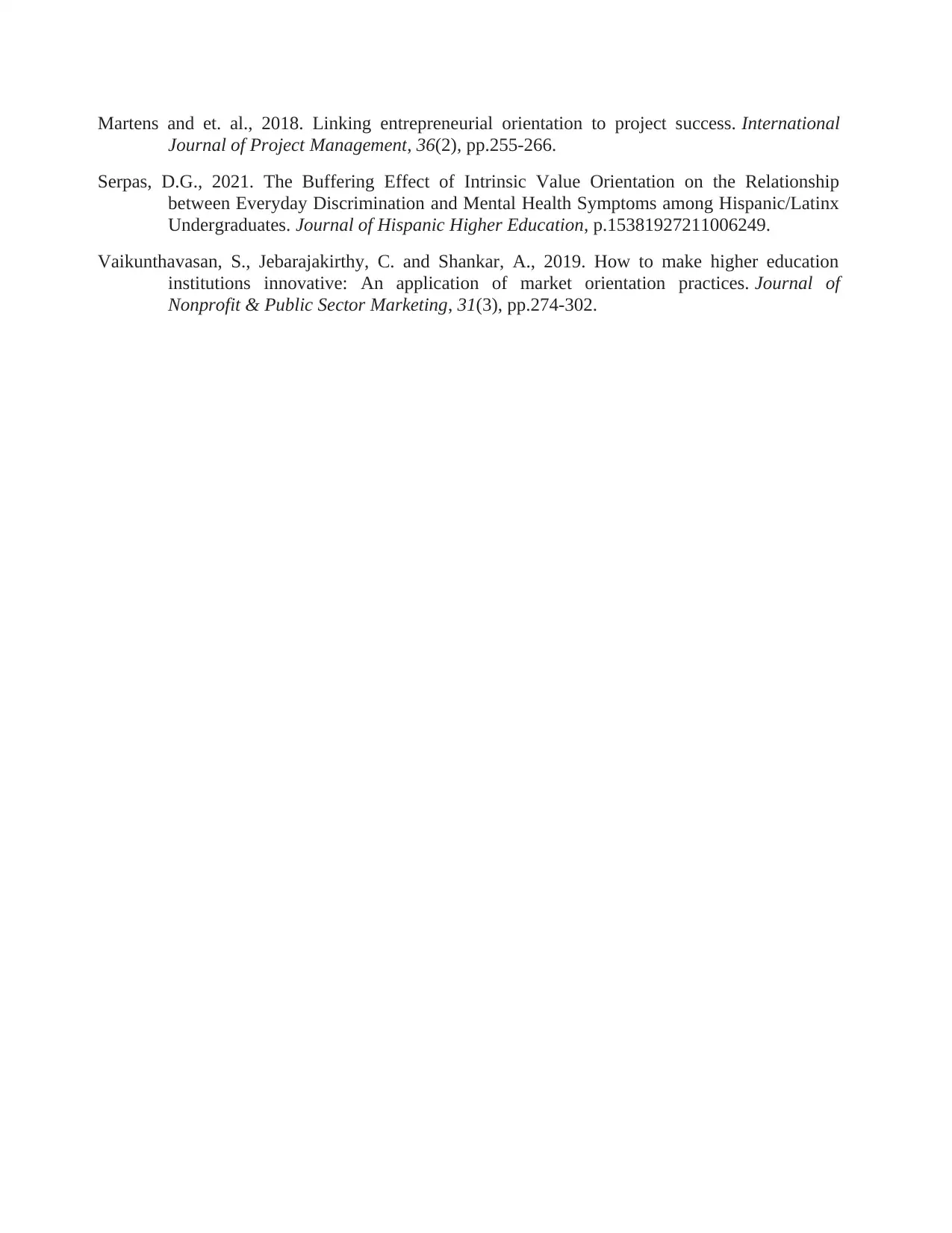
Martens and et. al., 2018. Linking entrepreneurial orientation to project success. International
Journal of Project Management, 36(2), pp.255-266.
Serpas, D.G., 2021. The Buffering Effect of Intrinsic Value Orientation on the Relationship
between Everyday Discrimination and Mental Health Symptoms among Hispanic/Latinx
Undergraduates. Journal of Hispanic Higher Education, p.15381927211006249.
Vaikunthavasan, S., Jebarajakirthy, C. and Shankar, A., 2019. How to make higher education
institutions innovative: An application of market orientation practices. Journal of
Nonprofit & Public Sector Marketing, 31(3), pp.274-302.
Journal of Project Management, 36(2), pp.255-266.
Serpas, D.G., 2021. The Buffering Effect of Intrinsic Value Orientation on the Relationship
between Everyday Discrimination and Mental Health Symptoms among Hispanic/Latinx
Undergraduates. Journal of Hispanic Higher Education, p.15381927211006249.
Vaikunthavasan, S., Jebarajakirthy, C. and Shankar, A., 2019. How to make higher education
institutions innovative: An application of market orientation practices. Journal of
Nonprofit & Public Sector Marketing, 31(3), pp.274-302.
⊘ This is a preview!⊘
Do you want full access?
Subscribe today to unlock all pages.

Trusted by 1+ million students worldwide
1 out of 9
Related Documents
Your All-in-One AI-Powered Toolkit for Academic Success.
+13062052269
info@desklib.com
Available 24*7 on WhatsApp / Email
![[object Object]](/_next/static/media/star-bottom.7253800d.svg)
Unlock your academic potential
Copyright © 2020–2025 A2Z Services. All Rights Reserved. Developed and managed by ZUCOL.



